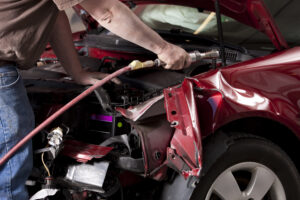
Associations & lawmakers working to build education pipeline for collision, automotive & other skilled trades
By onEducation | Legal
In an effort to shed light on the career paths that are available in the automotive industry, two organizations have partnered to form a new program while in Oregon and California more attention, including funding, is also being brought to education in skilled trades across the board.
The new program, formed by ASE Education Foundation and Goodguys Rod and Custom Association, along with partners in the industry, focuses on automotive design and engineering, manufacturing, mechanical, fabrication, paint, marketing, media, and sales discipline.
“Goodguys events are ideal to bring together future professionals and the companies that drive the industry. Goodguys events are not only fun, but they give students the chance to learn about available educational, scholarship and career opportunities and interact with automotive professionals from diverse industry backgrounds,” said Mike Coley, ASE Education Foundation president. “The automotive service industry needs qualified talent more than ever and our new partnership with Goodguys will help publicize the industry’s need for a well-trained, better-prepared future workforce.”
In Oregon, HB 2175 has been introduced to take $250,000 out of the state’s general fund to provide funding for existing programs at career technical schools in need. The bill states “an emergency is declared to exist” for the funding so, if passed, the bill would take effect July 1.
Auto Instructor Alex Crays at the Career Technical Education Center (CTEC) in Salem, Oregon spoke during January’s Collision Industry Conference (CIC) meeting in Palm Springs about the center’s auto body repair and painting program. Three students each received $1,000 worth of starter tools, including a toolbox, donated by companies in the industry to the March Taylor Memorial Fund to give to students.
The late March Taylor was a master technician, the owner of Auto Body Hawaii, and an industry leader who spearheaded the idea to create a centralized service for repairers to submit inquiries to challenge data provided by estimating systems based on real-world repairs. That idea later became the Database Enhancement Gateway (DEG).
The fund raises money to provide tool scholarships and mentorships to support collision technicians in the industry.
CTEC’s two-year automotive program currently has 78 students from six high schools in the Salem area with enrollment expected to increase next year.
“We take them through the whole process of how a car or vehicle would come through your repair shop from CSR to blueprinting to disassembly… hands-on on vehicles that have been donated from members of our community,” Crays said. “It gives them a great introduction and prepares them for a strong apprenticeship in our local shops.”
Calling Daniel Mendoza, Julian Moran, and Eddie Ceja the “cream of the crop,” Crays brought his students on stage to receive tools paid for from the March Taylor Memorial Fund — a surprise to them during their trip to Palm Springs for CIC.
“It’s just an awesome feeling to be able to invest in and to support these young people; for them to see, that hope that they can have a career versus just a job,” Crays said.
In California, four bills — AB290, AB377, AB1189, and AB1346 — related to evaluating the effectiveness of or funding for career tech programs in the state. The California Autobody Association (CAA) told Repairer Driven News it’s still reviewing bills coming before the industry that could affect the industry but does support CTE legislation.
“The CAA is very supportive of increased funding and programs that prepare students for career-relevant real-world skills such as autobody and collision repair,” said
Jack Molodanof, head CAA lobbyist. “The current level of California funding for high-quality CTE programs is insufficient to meet the needs of students and the state’s labor force. The ongoing funding of CTE programs in our schools is essential to serve the needs of students and to meet the state’s labor market demands. Participation in CTE classes motivates students to attend school more frequently and be more engaged, which improves overall academic outcomes. CAA generally supports CTE funding and other policy legislation that ensures that students gain the critical skills necessary to meet their own career goals as well as to build a strong workforce.”
Also in California, ASE and Goodguys say they’re going to work with local area high schools to identify and recruit students interested in careers in the transportation industry and will schedule Fridays at select Goodguys events as a hands-on career exploration project. Goodguys is located in Pleasanton, California.
Students will start the scheduled Fridays with a panel of experts and top industry professionals then be paired with a mentor and participate in a scavenger hunt where they will track down businesses and learn about a wide variety of automotive careers. Students will receive a free ticket to the Goodguys event so they can attend over the weekend.
“There are so many career opportunities within the automotive aftermarket and hot rodding,” said Andrew Ebel, COO of Goodguys Rod & Custom. “Working with the ASE Education Foundation gives us the opportunity to introduce students to many of the professional builders, painters and parts manufactures that attend our events across the nation. It will be a great experience for the students as well as for the industry professionals.”
Images
Featured image credit: avid_creative/iStock
More information
DEG’s Gredinberg recognized with March Taylor Kina’ole Award
